Healthcare Data Analyst Resume Examples

Jul 18, 2024
|
12 min read
Ace your healthcare data analyst resume: transform numbers into a job offer with our step-by-step guide. Learn key tips and tricks to make your experience stand out and show you're the data hero they need.
Rated by 348 people
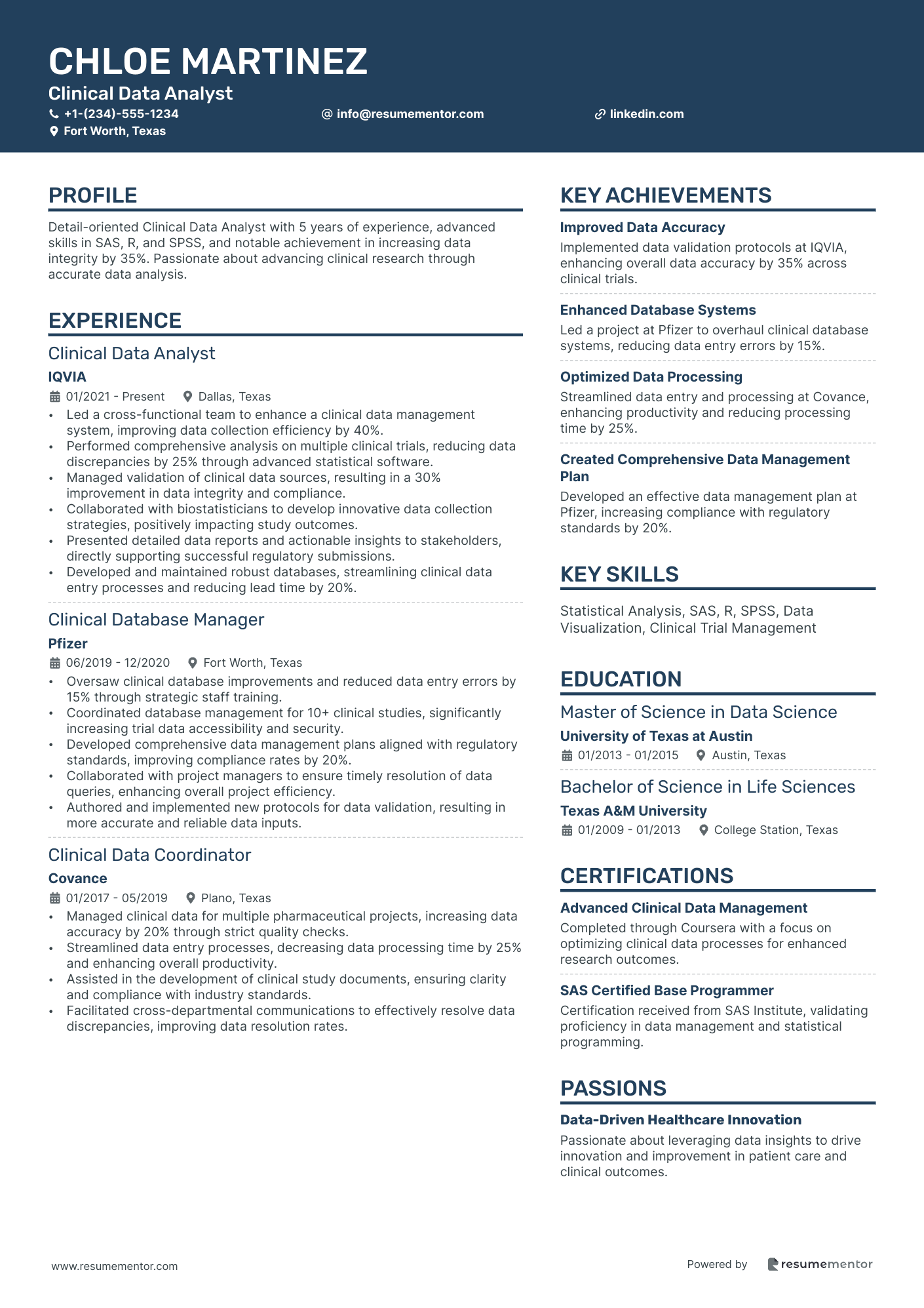
Clinical Data Analyst
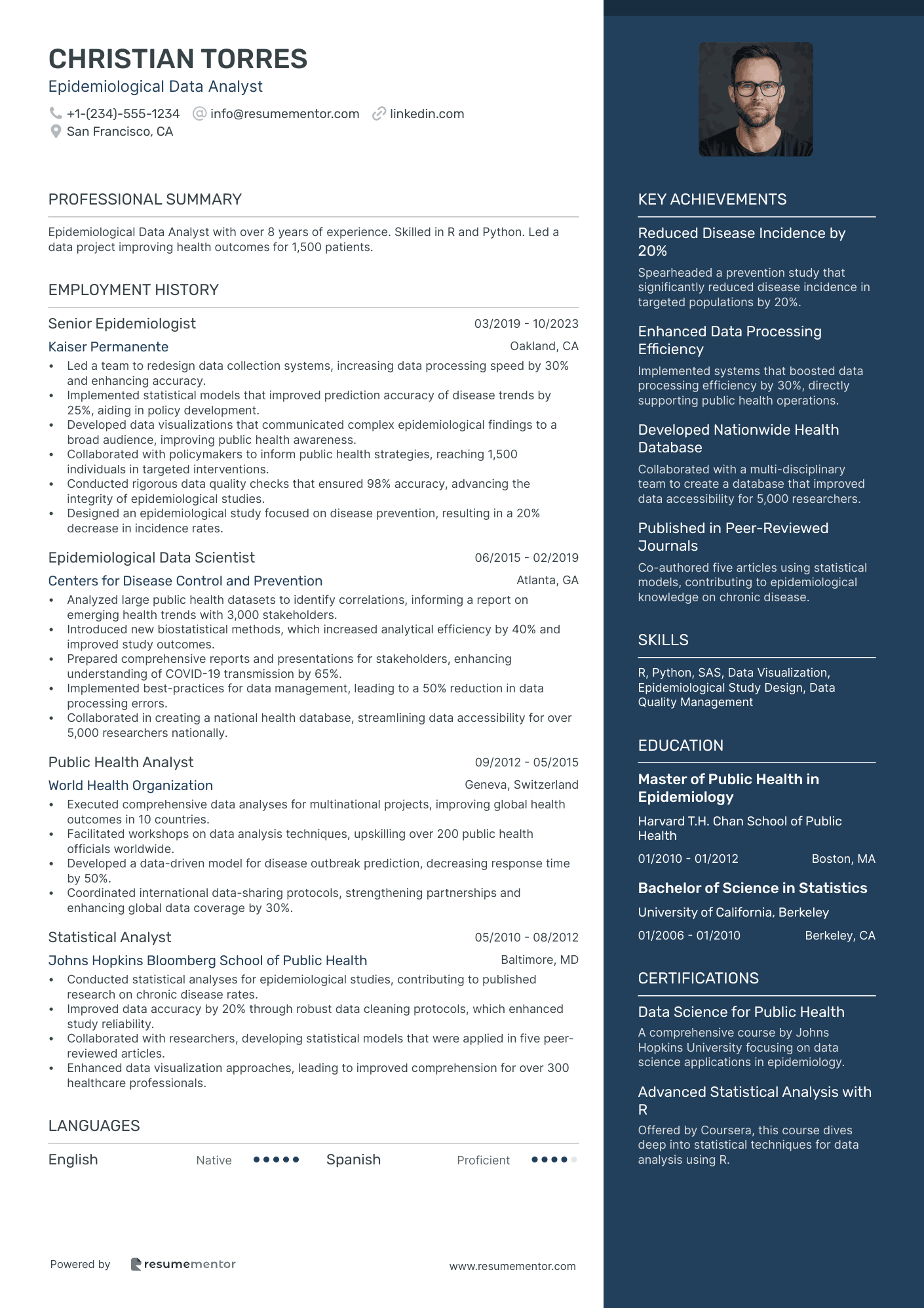
Epidemiological Data Analyst
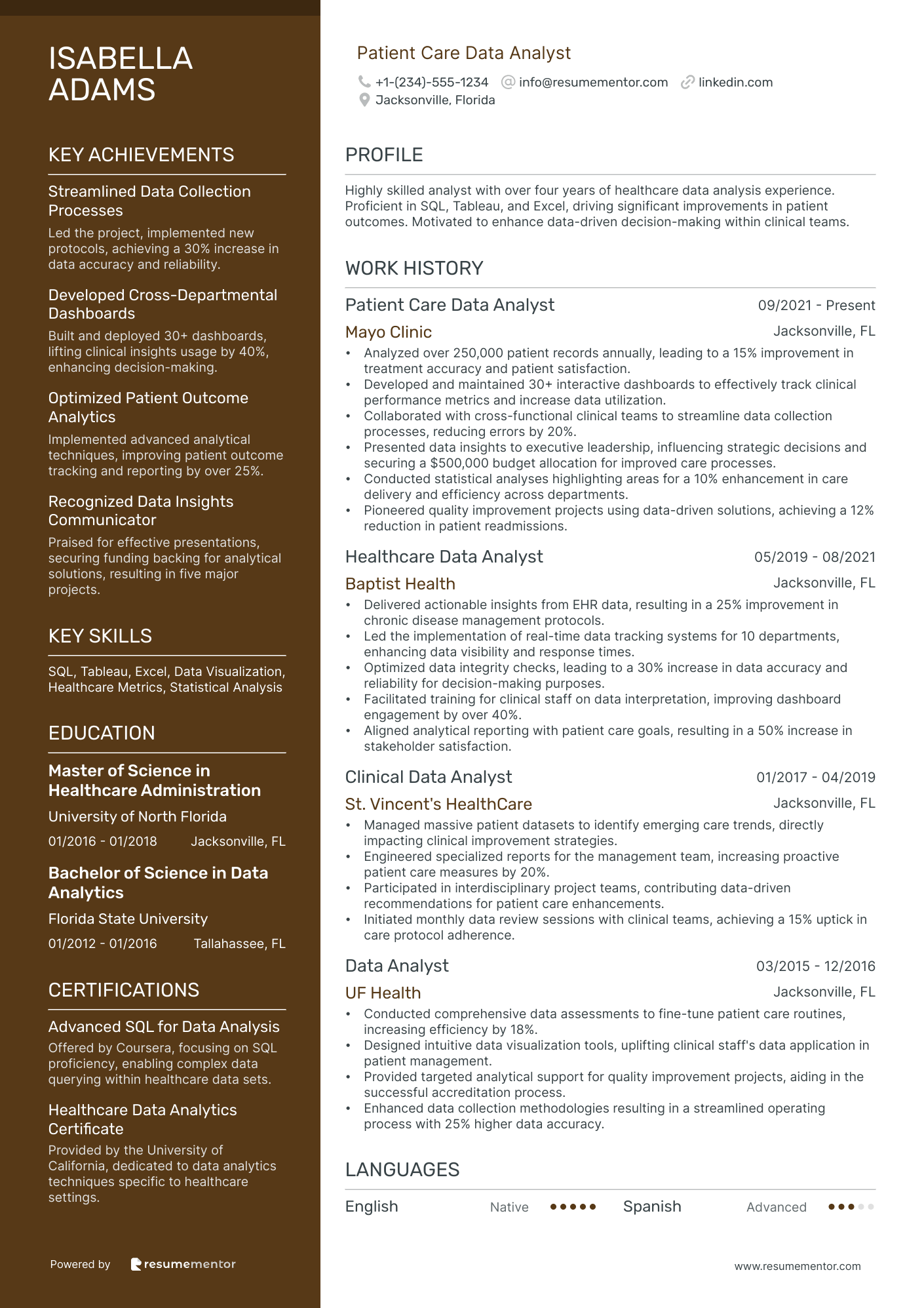
Patient Care Data Analyst
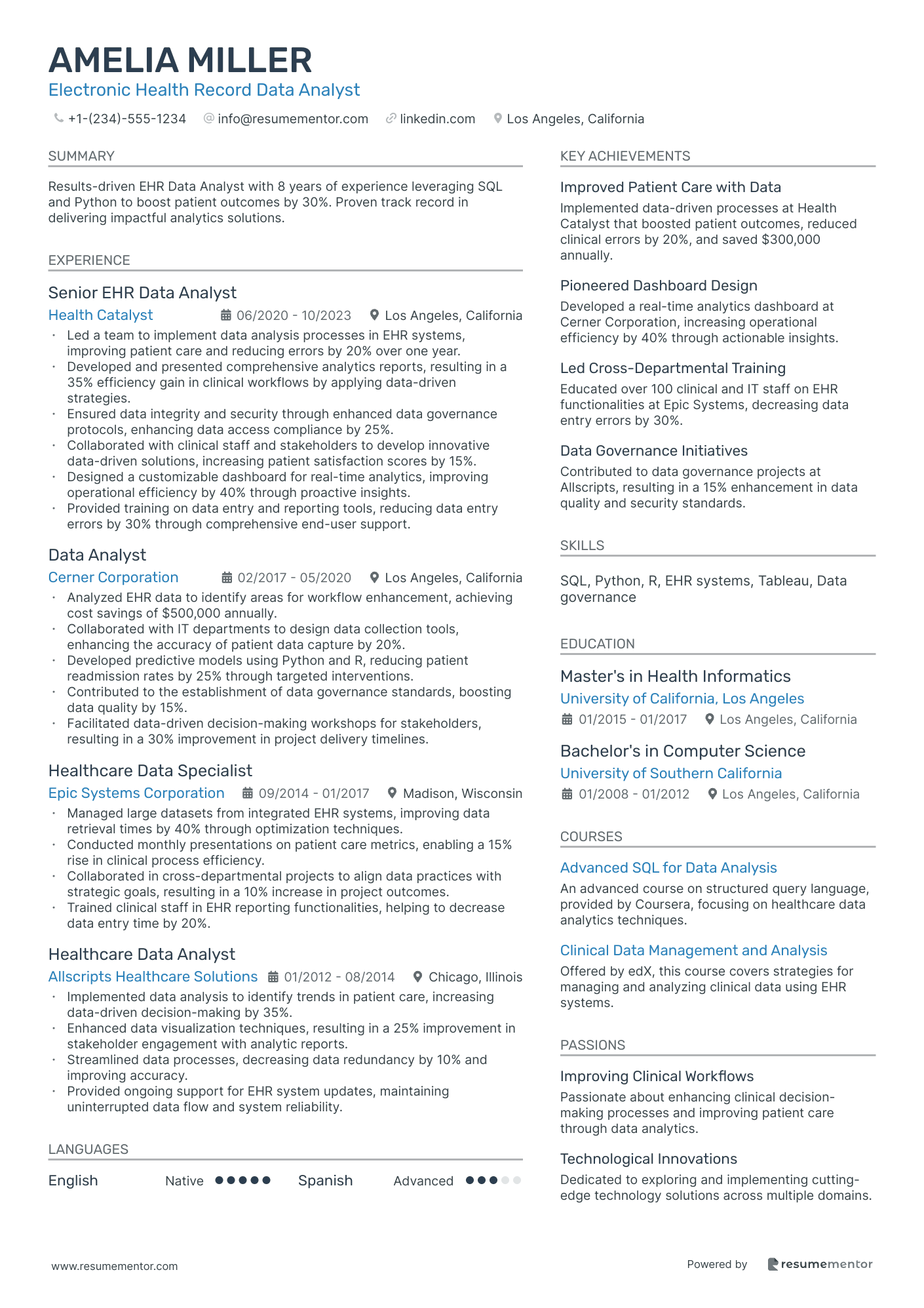
Electronic Health Record Data Analyst
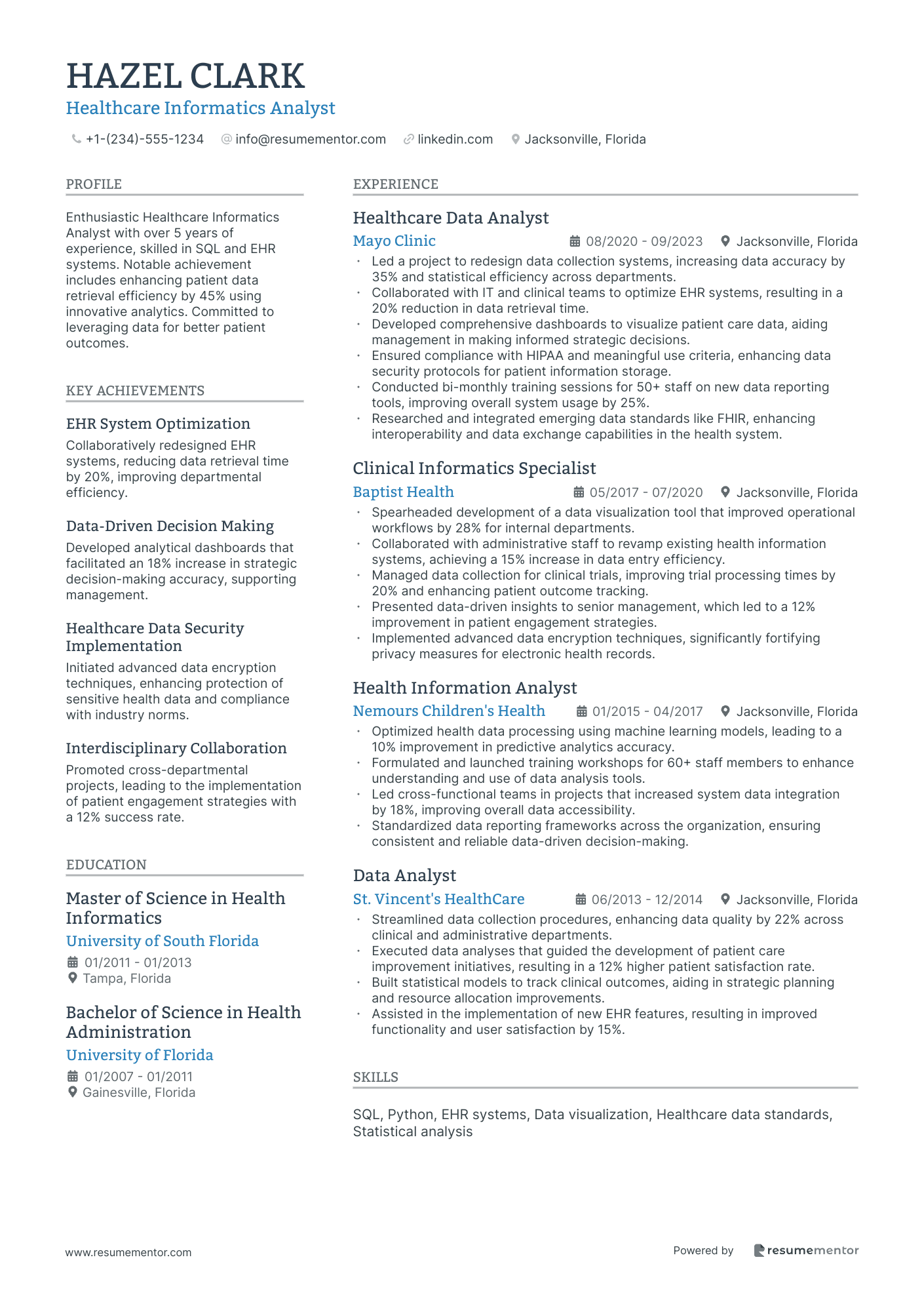
Healthcare Informatics Analyst
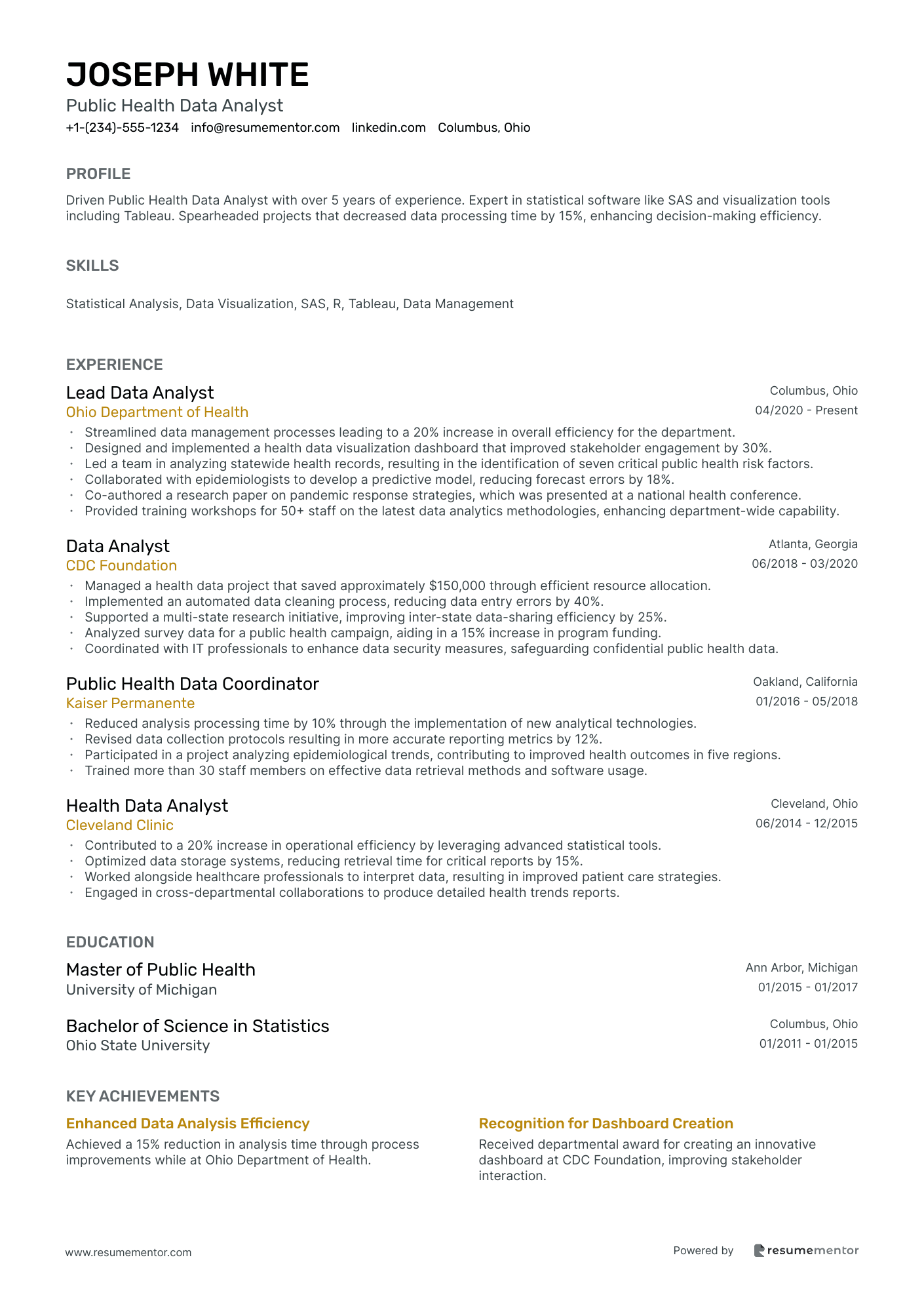
Public Health Data Analyst
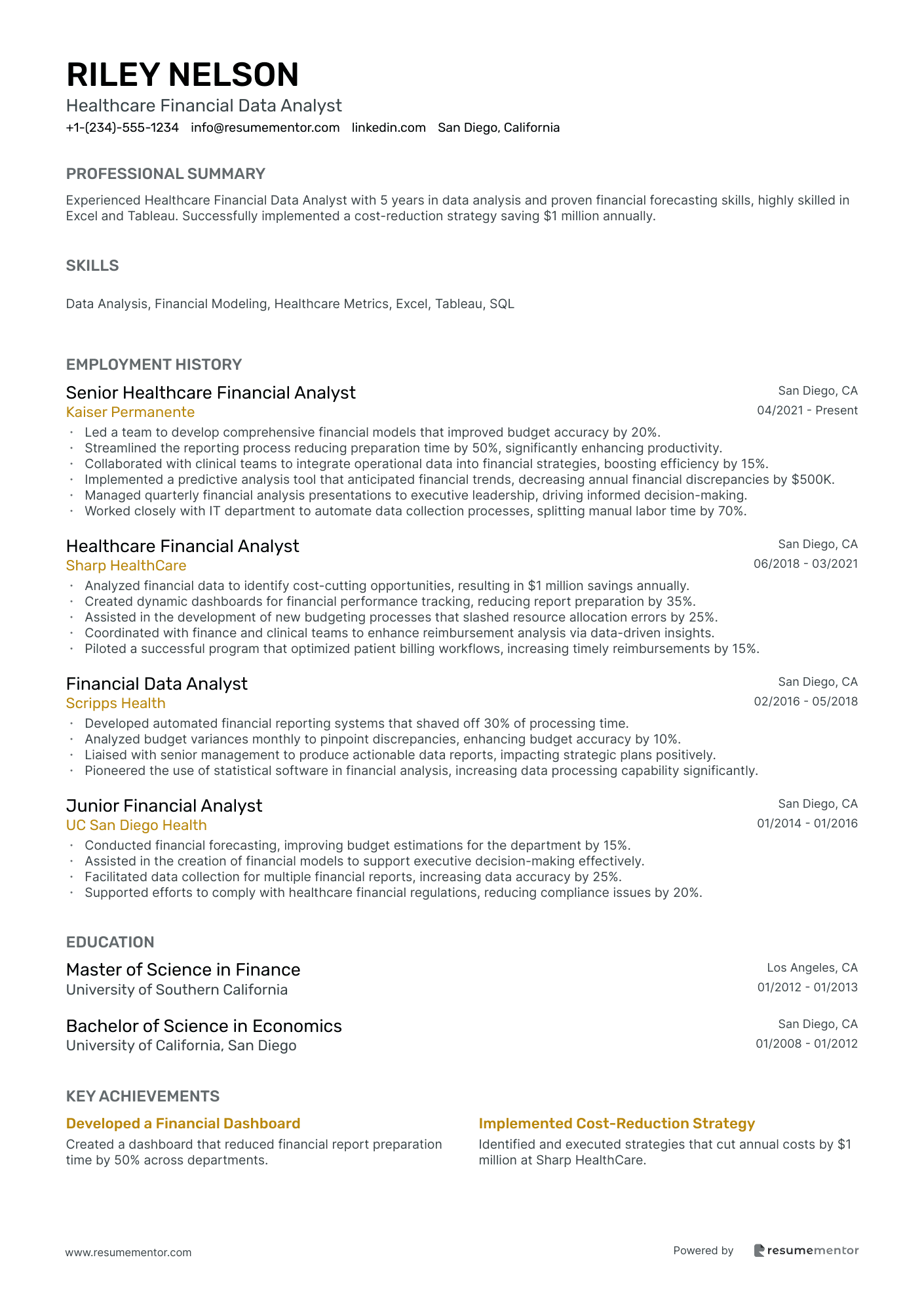
Healthcare Financial Data Analyst
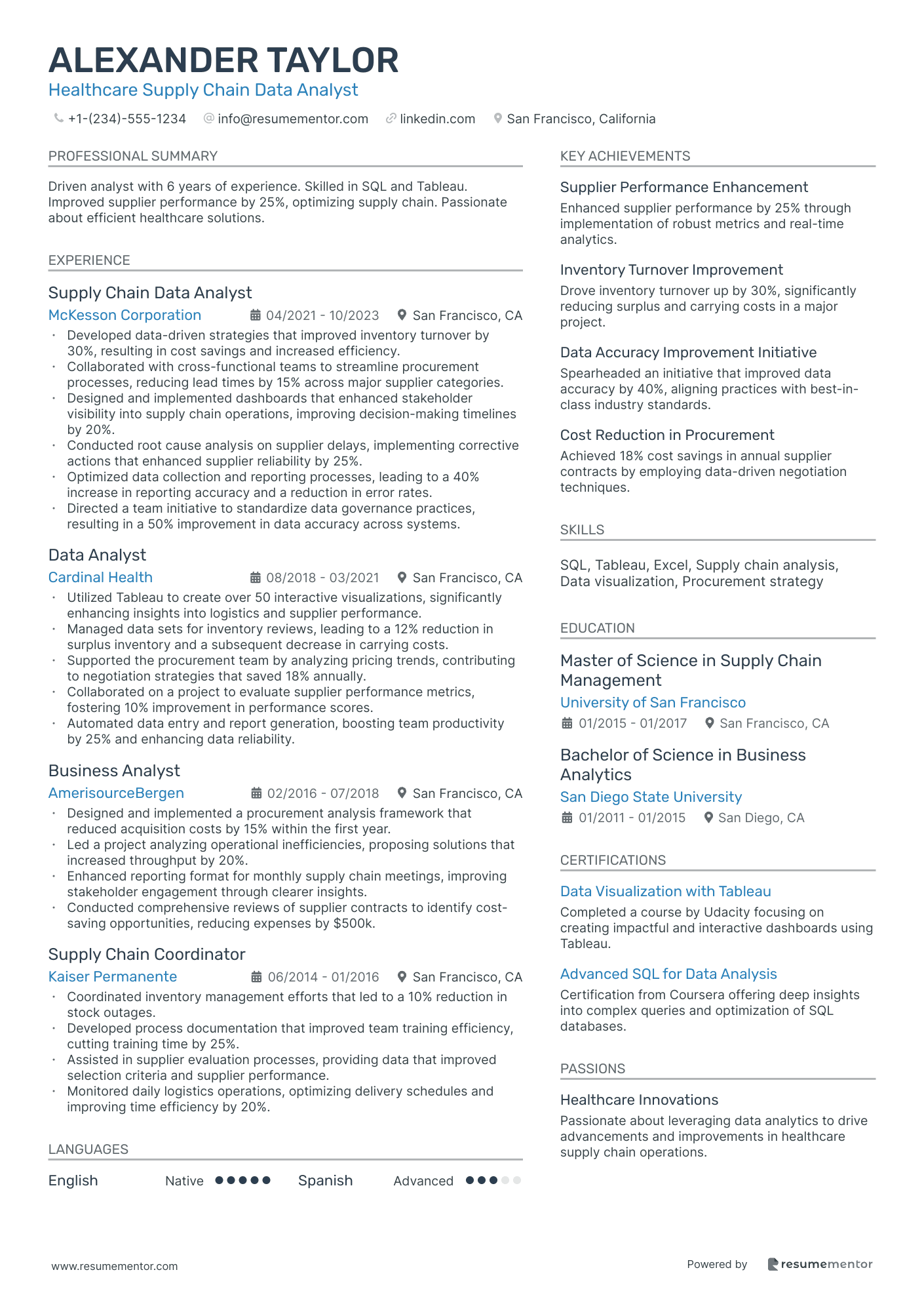
Healthcare Supply Chain Data Analyst
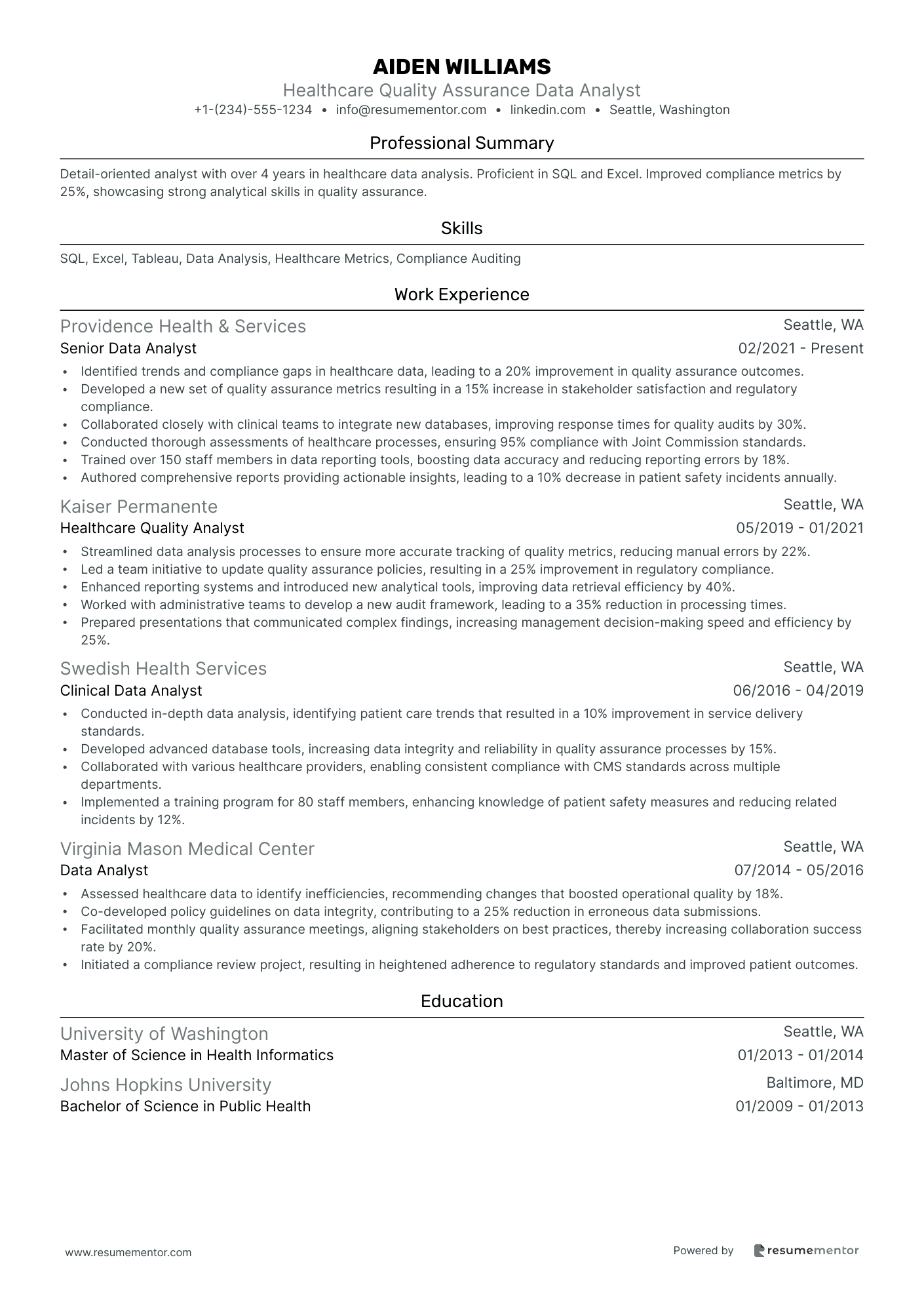
Healthcare Quality Assurance Data Analyst
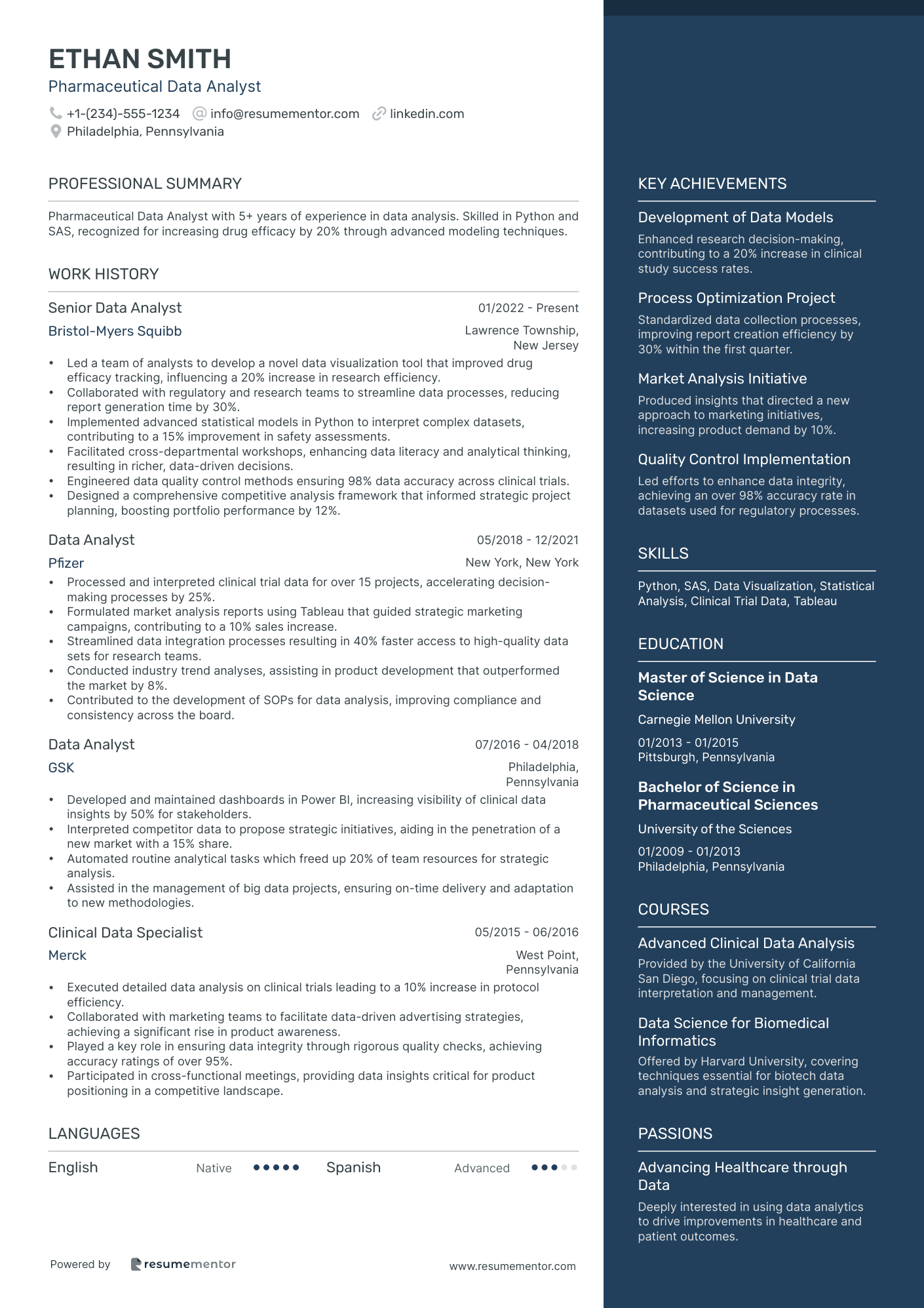
Pharmaceutical Data Analyst

Clinical Data Analyst resume sample
- •Led a cross-functional team to enhance a clinical data management system, improving data collection efficiency by 40%.
- •Performed comprehensive analysis on multiple clinical trials, reducing data discrepancies by 25% through advanced statistical software.
- •Managed validation of clinical data sources, resulting in a 30% improvement in data integrity and compliance.
- •Collaborated with biostatisticians to develop innovative data collection strategies, positively impacting study outcomes.
- •Presented detailed data reports and actionable insights to stakeholders, directly supporting successful regulatory submissions.
- •Developed and maintained robust databases, streamlining clinical data entry processes and reducing lead time by 20%.
- •Oversaw clinical database improvements and reduced data entry errors by 15% through strategic staff training.
- •Coordinated database management for 10+ clinical studies, significantly increasing trial data accessibility and security.
- •Developed comprehensive data management plans aligned with regulatory standards, improving compliance rates by 20%.
- •Collaborated with project managers to ensure timely resolution of data queries, enhancing overall project efficiency.
- •Authored and implemented new protocols for data validation, resulting in more accurate and reliable data inputs.
- •Managed clinical data for multiple pharmaceutical projects, increasing data accuracy by 20% through strict quality checks.
- •Streamlined data entry processes, decreasing data processing time by 25% and enhancing overall productivity.
- •Assisted in the development of clinical study documents, ensuring clarity and compliance with industry standards.
- •Facilitated cross-departmental communications to effectively resolve data discrepancies, improving data resolution rates.
- •Conducted data cleaning and validation for clinical trial datasets, resulting in a reduction of data anomalies by 30%.
- •Supported the preparation of clinical study documents to streamline the submission process for regulatory approvals.
- •Collaborated closely with researchers to optimize data collection methods, improving data collection efficiency by 15%.
- •Ensured adherence to GCP standards during data management, maintaining high levels of data integrity and compliance.
Epidemiological Data Analyst resume sample
- •Led a team to redesign data collection systems, increasing data processing speed by 30% and enhancing accuracy.
- •Implemented statistical models that improved prediction accuracy of disease trends by 25%, aiding in policy development.
- •Developed data visualizations that communicated complex epidemiological findings to a broad audience, improving public health awareness.
- •Collaborated with policymakers to inform public health strategies, reaching 1,500 individuals in targeted interventions.
- •Conducted rigorous data quality checks that ensured 98% accuracy, advancing the integrity of epidemiological studies.
- •Designed an epidemiological study focused on disease prevention, resulting in a 20% decrease in incidence rates.
- •Analyzed large public health datasets to identify correlations, informing a report on emerging health trends with 3,000 stakeholders.
- •Introduced new biostatistical methods, which increased analytical efficiency by 40% and improved study outcomes.
- •Prepared comprehensive reports and presentations for stakeholders, enhancing understanding of COVID-19 transmission by 65%.
- •Implemented best-practices for data management, leading to a 50% reduction in data processing errors.
- •Collaborated in creating a national health database, streamlining data accessibility for over 5,000 researchers nationally.
- •Executed comprehensive data analyses for multinational projects, improving global health outcomes in 10 countries.
- •Facilitated workshops on data analysis techniques, upskilling over 200 public health officials worldwide.
- •Developed a data-driven model for disease outbreak prediction, decreasing response time by 50%.
- •Coordinated international data-sharing protocols, strengthening partnerships and enhancing global data coverage by 30%.
- •Conducted statistical analyses for epidemiological studies, contributing to published research on chronic disease rates.
- •Improved data accuracy by 20% through robust data cleaning protocols, which enhanced study reliability.
- •Collaborated with researchers, developing statistical models that were applied in five peer-reviewed articles.
- •Enhanced data visualization approaches, leading to improved comprehension for over 300 healthcare professionals.
Patient Care Data Analyst resume sample
- •Analyzed over 250,000 patient records annually, leading to a 15% improvement in treatment accuracy and patient satisfaction.
- •Developed and maintained 30+ interactive dashboards to effectively track clinical performance metrics and increase data utilization.
- •Collaborated with cross-functional clinical teams to streamline data collection processes, reducing errors by 20%.
- •Presented data insights to executive leadership, influencing strategic decisions and securing a $500,000 budget allocation for improved care processes.
- •Conducted statistical analyses highlighting areas for a 10% enhancement in care delivery and efficiency across departments.
- •Pioneered quality improvement projects using data-driven solutions, achieving a 12% reduction in patient readmissions.
- •Delivered actionable insights from EHR data, resulting in a 25% improvement in chronic disease management protocols.
- •Led the implementation of real-time data tracking systems for 10 departments, enhancing data visibility and response times.
- •Optimized data integrity checks, leading to a 30% increase in data accuracy and reliability for decision-making purposes.
- •Facilitated training for clinical staff on data interpretation, improving dashboard engagement by over 40%.
- •Aligned analytical reporting with patient care goals, resulting in a 50% increase in stakeholder satisfaction.
- •Managed massive patient datasets to identify emerging care trends, directly impacting clinical improvement strategies.
- •Engineered specialized reports for the management team, increasing proactive patient care measures by 20%.
- •Participated in interdisciplinary project teams, contributing data-driven recommendations for patient care enhancements.
- •Initiated monthly data review sessions with clinical teams, achieving a 15% uptick in care protocol adherence.
- •Conducted comprehensive data assessments to fine-tune patient care routines, increasing efficiency by 18%.
- •Designed intuitive data visualization tools, uplifting clinical staff's data application in patient management.
- •Provided targeted analytical support for quality improvement projects, aiding in the successful accreditation process.
- •Enhanced data collection methodologies resulting in a streamlined operating process with 25% higher data accuracy.
Electronic Health Record Data Analyst resume sample
- •Led a team to implement data analysis processes in EHR systems, improving patient care and reducing errors by 20% over one year.
- •Developed and presented comprehensive analytics reports, resulting in a 35% efficiency gain in clinical workflows by applying data-driven strategies.
- •Ensured data integrity and security through enhanced data governance protocols, enhancing data access compliance by 25%.
- •Collaborated with clinical staff and stakeholders to develop innovative data-driven solutions, increasing patient satisfaction scores by 15%.
- •Designed a customizable dashboard for real-time analytics, improving operational efficiency by 40% through proactive insights.
- •Provided training on data entry and reporting tools, reducing data entry errors by 30% through comprehensive end-user support.
- •Analyzed EHR data to identify areas for workflow enhancement, achieving cost savings of $500,000 annually.
- •Collaborated with IT departments to design data collection tools, enhancing the accuracy of patient data capture by 20%.
- •Developed predictive models using Python and R, reducing patient readmission rates by 25% through targeted interventions.
- •Contributed to the establishment of data governance standards, boosting data quality by 15%.
- •Facilitated data-driven decision-making workshops for stakeholders, resulting in a 30% improvement in project delivery timelines.
- •Managed large datasets from integrated EHR systems, improving data retrieval times by 40% through optimization techniques.
- •Conducted monthly presentations on patient care metrics, enabling a 15% rise in clinical process efficiency.
- •Collaborated in cross-departmental projects to align data practices with strategic goals, resulting in a 10% increase in project outcomes.
- •Trained clinical staff in EHR reporting functionalities, helping to decrease data entry time by 20%.
- •Implemented data analysis to identify trends in patient care, increasing data-driven decision-making by 35%.
- •Enhanced data visualization techniques, resulting in a 25% improvement in stakeholder engagement with analytic reports.
- •Streamlined data processes, decreasing data redundancy by 10% and improving accuracy.
- •Provided ongoing support for EHR system updates, maintaining uninterrupted data flow and system reliability.
Healthcare Informatics Analyst resume sample
- •Led a project to redesign data collection systems, increasing data accuracy by 35% and statistical efficiency across departments.
- •Collaborated with IT and clinical teams to optimize EHR systems, resulting in a 20% reduction in data retrieval time.
- •Developed comprehensive dashboards to visualize patient care data, aiding management in making informed strategic decisions.
- •Ensured compliance with HIPAA and meaningful use criteria, enhancing data security protocols for patient information storage.
- •Conducted bi-monthly training sessions for 50+ staff on new data reporting tools, improving overall system usage by 25%.
- •Researched and integrated emerging data standards like FHIR, enhancing interoperability and data exchange capabilities in the health system.
- •Spearheaded development of a data visualization tool that improved operational workflows by 28% for internal departments.
- •Collaborated with administrative staff to revamp existing health information systems, achieving a 15% increase in data entry efficiency.
- •Managed data collection for clinical trials, improving trial processing times by 20% and enhancing patient outcome tracking.
- •Presented data-driven insights to senior management, which led to a 12% improvement in patient engagement strategies.
- •Implemented advanced data encryption techniques, significantly fortifying privacy measures for electronic health records.
- •Optimized health data processing using machine learning models, leading to a 10% improvement in predictive analytics accuracy.
- •Formulated and launched training workshops for 60+ staff members to enhance understanding and use of data analysis tools.
- •Led cross-functional teams in projects that increased system data integration by 18%, improving overall data accessibility.
- •Standardized data reporting frameworks across the organization, ensuring consistent and reliable data-driven decision-making.
- •Streamlined data collection procedures, enhancing data quality by 22% across clinical and administrative departments.
- •Executed data analyses that guided the development of patient care improvement initiatives, resulting in a 12% higher patient satisfaction rate.
- •Built statistical models to track clinical outcomes, aiding in strategic planning and resource allocation improvements.
- •Assisted in the implementation of new EHR features, resulting in improved functionality and user satisfaction by 15%.
Public Health Data Analyst resume sample
- •Streamlined data management processes leading to a 20% increase in overall efficiency for the department.
- •Designed and implemented a health data visualization dashboard that improved stakeholder engagement by 30%.
- •Led a team in analyzing statewide health records, resulting in the identification of seven critical public health risk factors.
- •Collaborated with epidemiologists to develop a predictive model, reducing forecast errors by 18%.
- •Co-authored a research paper on pandemic response strategies, which was presented at a national health conference.
- •Provided training workshops for 50+ staff on the latest data analytics methodologies, enhancing department-wide capability.
- •Managed a health data project that saved approximately $150,000 through efficient resource allocation.
- •Implemented an automated data cleaning process, reducing data entry errors by 40%.
- •Supported a multi-state research initiative, improving inter-state data-sharing efficiency by 25%.
- •Analyzed survey data for a public health campaign, aiding in a 15% increase in program funding.
- •Coordinated with IT professionals to enhance data security measures, safeguarding confidential public health data.
- •Reduced analysis processing time by 10% through the implementation of new analytical technologies.
- •Revised data collection protocols resulting in more accurate reporting metrics by 12%.
- •Participated in a project analyzing epidemiological trends, contributing to improved health outcomes in five regions.
- •Trained more than 30 staff members on effective data retrieval methods and software usage.
- •Contributed to a 20% increase in operational efficiency by leveraging advanced statistical tools.
- •Optimized data storage systems, reducing retrieval time for critical reports by 15%.
- •Worked alongside healthcare professionals to interpret data, resulting in improved patient care strategies.
- •Engaged in cross-departmental collaborations to produce detailed health trends reports.
Healthcare Financial Data Analyst resume sample
- •Led a team to develop comprehensive financial models that improved budget accuracy by 20%.
- •Streamlined the reporting process reducing preparation time by 50%, significantly enhancing productivity.
- •Collaborated with clinical teams to integrate operational data into financial strategies, boosting efficiency by 15%.
- •Implemented a predictive analysis tool that anticipated financial trends, decreasing annual financial discrepancies by $500K.
- •Managed quarterly financial analysis presentations to executive leadership, driving informed decision-making.
- •Worked closely with IT department to automate data collection processes, splitting manual labor time by 70%.
- •Analyzed financial data to identify cost-cutting opportunities, resulting in $1 million savings annually.
- •Created dynamic dashboards for financial performance tracking, reducing report preparation by 35%.
- •Assisted in the development of new budgeting processes that slashed resource allocation errors by 25%.
- •Coordinated with finance and clinical teams to enhance reimbursement analysis via data-driven insights.
- •Piloted a successful program that optimized patient billing workflows, increasing timely reimbursements by 15%.
- •Developed automated financial reporting systems that shaved off 30% of processing time.
- •Analyzed budget variances monthly to pinpoint discrepancies, enhancing budget accuracy by 10%.
- •Liaised with senior management to produce actionable data reports, impacting strategic plans positively.
- •Pioneered the use of statistical software in financial analysis, increasing data processing capability significantly.
- •Conducted financial forecasting, improving budget estimations for the department by 15%.
- •Assisted in the creation of financial models to support executive decision-making effectively.
- •Facilitated data collection for multiple financial reports, increasing data accuracy by 25%.
- •Supported efforts to comply with healthcare financial regulations, reducing compliance issues by 20%.
Healthcare Supply Chain Data Analyst resume sample
- •Developed data-driven strategies that improved inventory turnover by 30%, resulting in cost savings and increased efficiency.
- •Collaborated with cross-functional teams to streamline procurement processes, reducing lead times by 15% across major supplier categories.
- •Designed and implemented dashboards that enhanced stakeholder visibility into supply chain operations, improving decision-making timelines by 20%.
- •Conducted root cause analysis on supplier delays, implementing corrective actions that enhanced supplier reliability by 25%.
- •Optimized data collection and reporting processes, leading to a 40% increase in reporting accuracy and a reduction in error rates.
- •Directed a team initiative to standardize data governance practices, resulting in a 50% improvement in data accuracy across systems.
- •Utilized Tableau to create over 50 interactive visualizations, significantly enhancing insights into logistics and supplier performance.
- •Managed data sets for inventory reviews, leading to a 12% reduction in surplus inventory and a subsequent decrease in carrying costs.
- •Supported the procurement team by analyzing pricing trends, contributing to negotiation strategies that saved 18% annually.
- •Collaborated on a project to evaluate supplier performance metrics, fostering 10% improvement in performance scores.
- •Automated data entry and report generation, boosting team productivity by 25% and enhancing data reliability.
- •Designed and implemented a procurement analysis framework that reduced acquisition costs by 15% within the first year.
- •Led a project analyzing operational inefficiencies, proposing solutions that increased throughput by 20%.
- •Enhanced reporting format for monthly supply chain meetings, improving stakeholder engagement through clearer insights.
- •Conducted comprehensive reviews of supplier contracts to identify cost-saving opportunities, reducing expenses by $500k.
- •Coordinated inventory management efforts that led to a 10% reduction in stock outages.
- •Developed process documentation that improved team training efficiency, cutting training time by 25%.
- •Assisted in supplier evaluation processes, providing data that improved selection criteria and supplier performance.
- •Monitored daily logistics operations, optimizing delivery schedules and improving time efficiency by 20%.
Healthcare Quality Assurance Data Analyst resume sample
- •Identified trends and compliance gaps in healthcare data, leading to a 20% improvement in quality assurance outcomes.
- •Developed a new set of quality assurance metrics resulting in a 15% increase in stakeholder satisfaction and regulatory compliance.
- •Collaborated closely with clinical teams to integrate new databases, improving response times for quality audits by 30%.
- •Conducted thorough assessments of healthcare processes, ensuring 95% compliance with Joint Commission standards.
- •Trained over 150 staff members in data reporting tools, boosting data accuracy and reducing reporting errors by 18%.
- •Authored comprehensive reports providing actionable insights, leading to a 10% decrease in patient safety incidents annually.
- •Streamlined data analysis processes to ensure more accurate tracking of quality metrics, reducing manual errors by 22%.
- •Led a team initiative to update quality assurance policies, resulting in a 25% improvement in regulatory compliance.
- •Enhanced reporting systems and introduced new analytical tools, improving data retrieval efficiency by 40%.
- •Worked with administrative teams to develop a new audit framework, leading to a 35% reduction in processing times.
- •Prepared presentations that communicated complex findings, increasing management decision-making speed and efficiency by 25%.
- •Conducted in-depth data analysis, identifying patient care trends that resulted in a 10% improvement in service delivery standards.
- •Developed advanced database tools, increasing data integrity and reliability in quality assurance processes by 15%.
- •Collaborated with various healthcare providers, enabling consistent compliance with CMS standards across multiple departments.
- •Implemented a training program for 80 staff members, enhancing knowledge of patient safety measures and reducing related incidents by 12%.
- •Assessed healthcare data to identify inefficiencies, recommending changes that boosted operational quality by 18%.
- •Co-developed policy guidelines on data integrity, contributing to a 25% reduction in erroneous data submissions.
- •Facilitated monthly quality assurance meetings, aligning stakeholders on best practices, thereby increasing collaboration success rate by 20%.
- •Initiated a compliance review project, resulting in heightened adherence to regulatory standards and improved patient outcomes.
Pharmaceutical Data Analyst resume sample
- •Led a team of analysts to develop a novel data visualization tool that improved drug efficacy tracking, influencing a 20% increase in research efficiency.
- •Collaborated with regulatory and research teams to streamline data processes, reducing report generation time by 30%.
- •Implemented advanced statistical models in Python to interpret complex datasets, contributing to a 15% improvement in safety assessments.
- •Facilitated cross-departmental workshops, enhancing data literacy and analytical thinking, resulting in richer, data-driven decisions.
- •Engineered data quality control methods ensuring 98% data accuracy across clinical trials.
- •Designed a comprehensive competitive analysis framework that informed strategic project planning, boosting portfolio performance by 12%.
- •Processed and interpreted clinical trial data for over 15 projects, accelerating decision-making processes by 25%.
- •Formulated market analysis reports using Tableau that guided strategic marketing campaigns, contributing to a 10% sales increase.
- •Streamlined data integration processes resulting in 40% faster access to high-quality data sets for research teams.
- •Conducted industry trend analyses, assisting in product development that outperformed the market by 8%.
- •Contributed to the development of SOPs for data analysis, improving compliance and consistency across the board.
- •Developed and maintained dashboards in Power BI, increasing visibility of clinical data insights by 50% for stakeholders.
- •Interpreted competitor data to propose strategic initiatives, aiding in the penetration of a new market with a 15% share.
- •Automated routine analytical tasks which freed up 20% of team resources for strategic analysis.
- •Assisted in the management of big data projects, ensuring on-time delivery and adaptation to new methodologies.
- •Executed detailed data analysis on clinical trials leading to a 10% increase in protocol efficiency.
- •Collaborated with marketing teams to facilitate data-driven advertising strategies, achieving a significant rise in product awareness.
- •Played a key role in ensuring data integrity through rigorous quality checks, achieving accuracy ratings of over 95%.
- •Participated in cross-functional meetings, providing data insights critical for product positioning in a competitive landscape.
Navigating the job market as a healthcare data analyst can feel like steering a ship through a storm, given the crucial role you play in transforming data into insights that boost healthcare outcomes. Yet, despite your vital technical skills, translating these abilities onto a resume can be challenging. Your resume is often the first opportunity to make a strong impression, so presenting your skills and accomplishments effectively is essential.
Transforming complex technical expertise, such as data visualization and statistical analysis, into a cohesive story isn't always easy. This is where using a well-organized resume template can lighten your load. Templates can provide a clear structure that brings your key achievements and skills to the forefront, without overwhelming potential employers. By laying out your qualifications in a concise manner, you increase your chances of capturing a recruiter’s attention.
Aligning your resume with industry standards is crucial, and tailoring it specifically to healthcare data roles will further enhance its impact. A resume template can guide you in focusing on what truly matters, preventing you from getting sidetracked by technical details. With a variety available, you can select one that best reflects your professional style, making the writing process more straightforward.
As a data analyst, you understand the importance of presenting information clearly, and the same applies to your resume. By crafting it to be precise and data-driven, much like your analyses, you'll make a stronger case for your candidacy. Utilizing resources like resume templates from Resume Mentor can set you on the path to securing your next role with confidence.
Key Takeaways
- Your healthcare data analyst resume should emphasize expert management of healthcare data to improve patient care and should effectively highlight your technical skills and work experience.
- Use a well-structured resume template to clearly present your key achievements, tailoring your resume specifically to align with industry standards and healthcare data roles.
- Opt for a reverse-chronological resume format to feature your most recent experiences prominently, selecting clean fonts to ensure readability and professionalism.
- Quantifiable achievements in your experience section, such as percentage improvements, demonstrate the real-world impact of your data analysis skills and should be aligned with job descriptions.
- Incorporate a combination of technical and soft skills in your resume, highlight educational background and certifications, and consider extra sections like languages and volunteer work to offer a well-rounded profile.
What to focus on when writing your healthcare data analyst resume
Your healthcare data analyst resume should seamlessly convey your expertise in managing healthcare data and your role in enhancing patient care. By highlighting your skills with complex datasets, you emphasize your contribution to effective, data-driven decision-making in the healthcare sector. The way you organize your resume is crucial to ensuring that the most important information is noticed first. Below, we'll explore each key section, offering more in-depth guidance on what to include.
How to structure your healthcare data analyst resume
- Contact Information: Start with your name, phone number, email, and LinkedIn profile—ensuring easy access to your professional details. Keeping this information current and professional sets the initial tone for your resume. Your contact section is your first opportunity to present yourself as organized and accessible, which is essential in healthcare fields that value precision and clarity.
- Professional Summary: Move into a concise overview of your experience, underlining your skills with tools like SQL or Tableau. Show how these skills have positively impacted patient outcomes or boosted operational efficiency—providing a snapshot of your career that captures a recruiter's attention quickly. An effective summary aligns your core competencies with the priorities of the healthcare organizations you aim to join.
- Technical Skills: Follow up by highlighting your understanding of healthcare-specific software and data analysis tools. Experience with EHR systems, statistical analysis, and data visualization underscores your technical capabilities in the field—demonstrating your ability to handle the specialized tools used in healthcare data analytics. This section should reflect your readiness to leverage technology for better healthcare solutions.
- Work Experience: Detail your previous roles, emphasizing achievements like reducing patient wait times or improving billing accuracy. These examples demonstrate your practical impact and use of actionable insights—showing how you apply your skills in real-world settings. The experience section is where you illustrate your problem-solving skills and your ability to thrive in dynamic healthcare environments.
- Education and Certifications: Support your experience by listing your degrees and certifications like CHDA. Highlight related coursework or projects to further establish your expertise in healthcare data—ensuring that your educational background aligns with your career objectives. This educational foundation connects your academic achievements with your professional trajectory, preparing you for advanced roles.
- Projects: Describe specific projects that showcase your contributions to patient care or efficiency improvements. Explain your participation and the tools you used, tying back to your earlier listed technical skills—demonstrating a tangible impact on healthcare processes. By showcasing projects, you provide evidence of your initiative and your commitment to advancing healthcare through data analytics.
Now that you've seen an overview of what each section entails, we’ll cover each one in more depth below, ensuring that your resume highlights the most relevant skills and experiences.
Which resume format to choose
As a healthcare data analyst, selecting the right resume format is crucial in effectively highlighting your skills and experiences. The reverse-chronological format is the best choice because it puts your most recent and relevant experiences at the forefront. This is particularly important in the healthcare industry, where keeping abreast of the latest technologies and methodologies can significantly impact your candidacy. Employers prefer this format because it provides a clear narrative of your career trajectory and shows how your roles have evolved over time, which speaks volumes about your growth and adaptability.
When it comes to font choice, opting for modern and clean fonts like Rubik, Montserrat, or Lato can enhance the professional look of your resume. These fonts offer a polished appearance, which is crucial for maintaining the recruiter’s focus on the content rather than getting distracted by an unappealing design. The choice of font not only impacts readability but also contributes to the overall impression of modernity and professionalism, something highly valued in the tech-savvy healthcare sector.
Saving your resume as a PDF is a non-negotiable step in preserving the integrity of your document’s layout and design. This file type ensures that all your hard work in formatting remains consistent across different platforms and devices, which is essential when your resume reaches various healthcare recruiters and decision-makers. PDFs prevent potential formatting mishaps that can occur with other file types, guiding the focus on your skills and accomplishments without distraction.
Finally, setting your margins to one inch all around helps in achieving a balanced and organized layout. This spacing is vital for visually separating sections and making your resume easy to navigate, which is especially important in roles that value attention to detail, such as healthcare data analysis. Sufficient margins ensure that your information is not cramped, allowing your key achievements and skills to shine through clearly, making it easy for recruiters to identify your strengths quickly.
By paying attention to these details, your resume will come together as a cohesive and professional document, ready to open doors to new opportunities in the healthcare field.
How to write a quantifiable resume experience section
A solid healthcare data analyst experience section emphasizes your ability to handle complex healthcare data, which is essential for any employer in this field. To create an effective section, structure it to highlight your most relevant achievements, directly showing the impact you've had in previous roles. This part of your resume allows employers to see how your contributions have made a difference in past jobs and should be precisely tailored to the job description you are targeting. Begin with your most recent job and cover the last 10–15 years. Concentrate on job titles that align closely with a healthcare data analyst role. Use clear, strong action words like "analyzed," "developed," and "implemented" to vividly describe your achievements. Integrate keywords from the job listing within your experience section to highlight the relevance of your past work to their requirements.
- •Enhanced patient data accuracy by 30% through a new data validation process.
- •Reduced report generation time by 40% by optimizing data extraction techniques.
- •Worked with cross-functional teams to create data governance policies, boosting data reliability by 25%.
- •Built a predictive analytics model that cut hospital readmissions by 15%.
In this healthcare data analyst experience section, your past contributions directly connect with potential employers' needs by providing quantifiable achievements. Specifics like percentage improvements and reductions show your data management skills, essential in healthcare analysis, while strong action verbs bring clarity to your involvement. By tailoring these points to a specific job ad, you address industry needs such as data accuracy, efficiency, and improved healthcare outcomes, ensuring a seamless alignment of your resume with what employers are looking for. This approach ties together the details, creating a cohesive narrative that flows naturally and engages the reader.
Project-Focused resume experience section
A project-focused healthcare data analyst resume experience section should clearly highlight your contributions and the impact of your work. Begin by noting your job title and the organization where you worked, then dive into the specifics of each project. Describe the project scope, your role, and the tools you used. It's essential to show how your work guided decisions, improved processes, or provided valuable insights, helping the organization achieve its goals.
To make your achievements stand out, back them up with concrete metrics, such as increases in efficiency or cost reductions. Use straightforward language, and avoid overly technical terms that might confuse the reader. Each entry should paint a cohesive picture of your analytical skills and problem-solving abilities, clearly illustrating the value you bring to potential employers by effectively connecting your experiences and outcomes.
Healthcare Data Analyst
Green Valley Hospital
June 2020 - Present
- Led efforts to optimize hospital inventory management, cutting waste by 15%.
- Analyzed patient data to spot trends, helping identify high-risk patients sooner and improving outcomes.
- Created dashboards with Tableau to make data easily accessible for over 50 healthcare providers.
- Simplified data processes, slashing report preparation time from 2 days to just 4 hours.
Skills-Focused resume experience section
A skills-focused healthcare data analyst resume experience section should clearly demonstrate your expertise and the real-world impact of your work. Start by reflecting on the projects or tasks where you've made the most significant contributions, like enhancing data processes or boosting reporting efficiency. These are the achievements you want to highlight. Describe your actions and their outcomes in a clear, specific way, concentrating on how you drove improvements in efficiency, cost savings, or decision-making.
Use strong action verbs to convey your role and the skills you applied in each situation. This method helps potential employers quickly recognize your value. Whenever possible, back up your achievements with numbers, as quantifying results often communicates effectiveness more forcefully than words alone. Avoid making vague statements or simply listing job duties without context. Employers are looking for tangible evidence of your problem-solving skills and your ability to leverage your expertise to achieve meaningful outcomes.
Healthcare Data Analyst
City Hospital
June 2020 - Present
- Developed a data visualization dashboard that improved reporting speed by 30% for quarterly reviews.
- Analyzed patient records to identify a 15% improvement in treatment efficacy, helping optimize care plans.
- Reduced data processing time by 40 hours per month through the implementation of automated data auditing methods.
- Collaborated with clinical staff to design a data-driven diagnostic tool that decreased diagnosis time by 20%.
Collaboration-Focused resume experience section
A collaboration-focused healthcare data analyst resume experience section should clearly demonstrate how you work effectively with others. Start by listing your past roles, highlighting projects where teamwork was key to success. Share specific stories of partnering with healthcare professionals to solve problems and enhance patient care. For instance, you might have collaborated with a cross-functional team to streamline data management processes, which boosted efficiency by 25%.
Next, illustrate how your efforts with clinicians to identify key patient outcome metrics led to a 30% improvement in reporting accuracy. Regular meetings with research and IT departments may have ensured that data integration projects met diverse needs and timelines. Finally, emphasize initiatives you led, such as standardizing data entry protocols across departments, which resulted in a 40% reduction in error rates. This cohesive narrative allows potential employers to see the real-world impact of your collaborative skills.
Healthcare Data Analyst
HealthTech Solutions
June 2020 - September 2023
- Collaborated with a cross-functional team to streamline data management processes, boosting efficiency by 25%.
- Worked side-by-side with clinicians to identify and track key patient outcome metrics, enhancing reporting accuracy by 30%.
- Engaged in regular meetings with research and IT departments to ensure data integration projects met everyone's needs and timelines.
- Led the effort to standardize data entry protocols across departments, cutting error rates by 40%.
Innovation-Focused resume experience section
An innovation-focused healthcare data analyst resume experience section should clearly demonstrate how you use data to spark new ideas and drive transformative change. Begin by highlighting your contributions to developing cutting-edge solutions and refining data processes, which, in turn, enhance healthcare operations. Your bullet points should not just list tasks but instead focus on quantifiable achievements that showcase your ability to leverage data creatively. By using active language and illustrating impressive outcomes, you can convey the true impact of your work.
Make sure to select experiences that shine a light on your skills in pushing innovation through data analysis. Clearly list your job title and company, and ensure that each bullet point expresses the unique value you provided. Instead of simply detailing responsibilities, pinpoint your accomplishments and their effects on the organization. Be specific with examples of projects where you played a key role or led initiatives. This approach will reflect your enthusiasm and effectiveness in using data to propel healthcare advancements.
Healthcare Data Analyst
City Hospital
Jan 2020 - Present
- Developed a predictive analytics model that decreased patient readmission rates by 15% over 6 months.
- Streamlined data collection processes, reducing errors by 20% and enhancing data accuracy and reliability.
- Led a cross-functional team to design a new dashboard system for real-time patient data monitoring, improving decision-making speed.
- Pioneered a data-driven approach for resource allocation, resulting in 10% cost savings annually.
Write your healthcare data analyst resume summary section
A healthcare-focused data analyst resume summary should highlight not just your skills and experience, but also the tangible value you bring to potential employers. This section serves as a compelling introduction, quickly showcasing your expertise. When you have experience in the field, it's important to emphasize your achievements and demonstrate how you've improved data processes. For instance:
This example clearly communicates not just your skills and accomplishments, but also the positive impact you have had in previous roles. Using metrics like improved data accuracy and reduced reporting times helps to illustrate your effectiveness. When describing yourself on a resume, it's vital to maintain clarity and confidence, without overstating your case. A well-done summary highlights your experience, the unique value you bring, and the specific skills that make you a strong candidate.
Understanding the purpose of a resume summary compared to other sections is crucial. A resume objective, which is more focused on your career aspirations, works best for those at an entry level. For example, "Aspiring healthcare data analyst eager to leverage strong analytical skills and healthcare knowledge in a dynamic environment." On the other hand, a summary of qualifications lists key skills and experiences in bullet points, ideal for seasoned professionals. A resume profile offers a quick overview of your main skills and career successes, blending elements of both a summary and an objective. Tailoring your resume approach based on your experience level ensures that you effectively communicate why you're the right fit for the role.
Listing your healthcare data analyst skills on your resume
A healthcare-focused data analyst resume should clearly demonstrate your skills and how they align with the job. You can opt to have a separate section dedicated to skills or blend them seamlessly into your experience or summary. This approach highlights your talents clearly while reinforcing them with your work history, making you a standout candidate.
Strengths and soft skills are about your character and how you interact with others, such as being a problem-solver or a team player. In contrast, hard skills are specific abilities like programming or data analysis that reflect your technical expertise. Both types of skills can act as resume keywords, drawing the attention of automated systems and recruiters who are searching for specific qualifications.
Here's an example of how a standalone skills section might look in your resume:
This section is effective by listing key skills crucial to healthcare data analysis, allowing hiring managers to see your qualifications at a glance. The concise phrases ensure clarity, keeping your resume straightforward and focused.
Best hard skills to feature on your healthcare data analyst resume
Your hard skills display your technical abilities, showcasing what you bring to the table. They illustrate your proficiency with the tools and techniques essential for healthcare data analysis, communicating your readiness for the role.
Hard Skills
- Data Analysis
- SQL
- Data Visualization
- Statistical Software (e.g., SAS, SPSS)
- Predictive Analytics
- Machine Learning
- EMR Systems (Electronic Medical Records)
- Data Quality Assurance
- Python or R Programming
- Data Warehousing
- Health Information Exchange (HIE)
- Clinical Data Management
- ETL (Extract, Transform, Load) Processes
- Database Management Systems
- Healthcare Regulations Compliance Knowledge
Best soft skills to feature on your healthcare data analyst resume
Soft skills reflect how you interact with others and manage your responsibilities. Highlighting them underscores your personal qualities, illustrating your ability to combine technical skills with effective communication and teamwork.
Soft Skills
- Problem Solving
- Attention to Detail
- Critical Thinking
- Communication
- Team Collaboration
- Adaptability
- Time Management
- Creativity
- Conflict Resolution
- Leadership
- Empathy
- Customer Focus
- Organization
- Reliability
- Stress Management
How to include your education on your resume
The education section of your resume is crucial, especially for positions like a healthcare data analyst, where specific educational qualifications can set you apart. It should be tailored to the job you're applying for, meaning that any irrelevant education is best left out. Including a GPA can be beneficial if it's a 3.5 or higher, as it demonstrates academic excellence. If you graduated with honors, such as cum laude, this should also be mentioned to emphasize your achievements. When listing a degree, clearly state the degree type, major, and the institution to provide a complete picture.
Here's an example of what not to do:
- •Took classes in history and philosophy
And here's a refined example:
The second example is strong because it directly relates to the job, highlighting a degree in Health Informatics, which is crucial for a healthcare data analyst role. The high GPA is included to demonstrate academic prowess, and there's a clear start and end date for the degree. The inclusion of honors like a high GPA signals to potential employers your commitment and capability in a relevant field.
How to include healthcare data analyst certificates on your resume
Including a certificates section on your healthcare data analyst resume is crucial. Certifications show your dedication to the field and your continual learning. List the name of the certification first. Include the date you achieved the certification next. Add the issuing organization too. Certificates can also be highlighted in the header for better visibility. For example: John Doe, Healthcare Data Analyst | Certified Health Data Analyst (CHDA).
This example is solid because it includes relevant and recognized certifications. Employers will instantly recognize that these certifications are specific to healthcare and data analysis. Each certification clearly states the issuing organization, which adds credibility. This well-organized section quickly tells employers that you have specialized skills and a commitment to professional growth. It also makes your resume stand out among others. It shows you are well-prepared for the role of a Healthcare Data Analyst.
Extra sections to include in your healthcare data analyst resume
When crafting your healthcare data analyst resume, it is important to present a well-rounded view of both your professional and personal attributes. By thoughtfully including sections such as languages, hobbies and interests, volunteer work, and books, you can stand out to potential employers.
Languages — List any additional languages you speak to highlight your ability to work in diverse environments. This skill can be a great advantage in a globalized healthcare setting.
Hobbies and interests — Share your personal interests to give a sense of who you are outside of work. This can show employers that you have a balanced life and varied skills.
Volunteer work — Detail volunteer experiences to demonstrate your commitment to community and ability to manage multiple tasks. This can underline your dedication and teamwork skills.
Books — Mention books you have read that are relevant to your profession to show your dedication to continuous learning. This can set you apart as someone who goes beyond just formal education.
Including these sections can make your resume more engaging and give hiring managers a fuller picture of your capabilities and personality. This approach can help you connect with potential employers on multiple levels. Make sure each section is concise and relevant to the role you are applying for.
In Conclusion
In conclusion, crafting an impactful resume as a healthcare data analyst is about more than just listing your skills and experiences. It's about telling a compelling story that highlights your technical expertise, achievements, and the unique value you bring to prospective employers. A well-structured resume not only showcases your ability to analyze and interpret complex data but also how those insights contribute to improved healthcare outcomes. Using a reverse-chronological format helps keep your resume organized and your most recent roles at the forefront, giving employers a clear view of your career progression. By tailoring your resume to each specific role, you demonstrate your understanding of industry needs and your ability to meet them. Including both hard and soft skills shows a balanced skill set, essential for roles that rely on both technical expertise and collaboration. Certificates and educational achievements bolster your qualifications, proving your commitment to the field. Adding extra sections like languages or volunteer work can also offer more depth to your profile and set you apart in a competitive job market. Remember, your resume is a powerful tool that reflects not only your past accomplishments but also your future potential, paving the way to new opportunities in the healthcare sector.
Related Articles

Continue Reading
Check more recommended readings to get the job of your dreams.
Resume
Resources
Tools
© 2026. All rights reserved.
Made with love by people who care.

